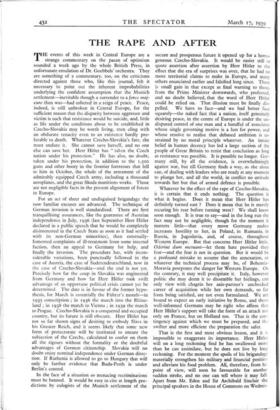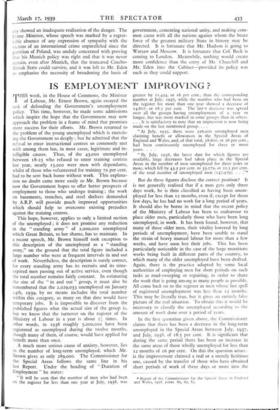THE RAPE AND AFTER
THE events of this week in Central Europe are a strange commentary on the paean of optimism sounded a week ago by the whole British Press, in unfortunate emulation of Dr. Goebbels' orchestra. They are something of a commentary, too, on the criticisms directed against those who, like this journal, felt it necessary to point out the inherent improbabilities underlying the confident assumption that the Munich settlement—inevitable though a surrender to a force maj- eure then was—had ushered in a reign of peace. Peace, indeed, is still unbroken in Central Europe, for the sufficient reason that the disparity between aggressor and victim is such that resistance would be suicide, and, little as life under the conditions about to be established in Czecho-Slovakia may be worth living, men cling with an obdurate tenacity even to an existence hardly pre- ferable to death. Whatever Czecho-Slovakia's fate, she must endure it. She cannot save herself, and no one else can save her. Herr Hitler has " taken the Czech nation under his protection." He has also, no doubt, taken under his protection, in addition to the 1,50o guns and other booty in the frontier fortresses that fell to him in October, the whole of the armament of the admirably equipped Czech army, including a thousand aeroplanes, and the great Skoda munitions works. Those are not negligible facts in the present alignment of forces in Europe.
For an act of sheer and undisguised brigandage the now familiar excuses are advanced. The technique of German invasion is well standardised. There are first tranquillising assurances, like the guarantee of Austrian independence in July, 1936 (last September Herr Hitler declared in a public speech that he would be completely disinterested in the Czech State as soon as it had settled with its non-German minorities), then externally- fomented complaints of ill-treatment from some internal faction, then an appeal to Germany for help, and finally the invasion. The procedure has, with incon- siderable variations, been punctually followed in the case of Austria, the case of Sudetendeutschland, now in the case of Czecho-Slovakia—and the end is not yet. Precisely how far the coup in Slovakia was engineered from Germany and how far Herr Hitler took swift advantage of an opportune political crisis cannot yet be determined. The date is in favour of the former hypo- thesis, for March is essentially the Fiihrer's month—in 1935 conscription ; in 1936 the march into the Rhine- land ; in 1938 the march to Vienna ; in 1939 the march to Prague. Czecho-Slovakia is a conquered and occupied country, but its future is still obscure. Herr Hitler has not so far shown signs of desiring to embody Slays in his Greater Reich, and it seems likely that some new form of protectorate will be instituted to ensure the subjection of the Czechs, calculated to confer on them all the rigours without the formality or the doubtful advantages of German citizenship. Slovakia will no doubt enjoy nominal independence under German direc- tion. If Ruthenia is allowed to go to Hungary that will only be further evidence that Buda-Pesth is under Berlin's control.
In the face of a situation so menacing recriminations must be banned. It would be easy to cite at length pre- dictions by eulogists of the Munich settlement of the secure and prosperous future it opened up for a homo- geneous Czecho-Slovakia. It would be easier still to quote assertion after assertion by Herr Hitler to the effect that the era of surprises was over, that he had no more territorial claims to make in Europe, and many others enunciated earlier and falsified long since. There is small gain in that except as final warning to those, from the Prime Minister downwards, who professed, and no doubt believed, that the word of Herr Hitler could be relied on. That illusion must be finally dis- pelled. We have to face—and we had better face squarely—the naked fact that a nation, itself genuinely desiring peace, in the centre of Europe is under the un- disputed control of one man and a handful of associates whose single governing motive is a lust for power, and whose resolve to realise that debased ambition is re- strained by no moral principle whatever. An innate belief in human decency has led a large section of the people of Great Britain to resist that conclusion as long as resistance was possible. It is possible no longer. Ger- many still, by all the evidence, is overwhelmingly against war, but till Germany finds a way, as she alone can, of dealing with leaders who are ready at any moment to plunge her, and all the world, in conflict no attitude towards her but that of armed defence is possible.
Whatever be the effect of the rape of Czecho-Slovakia, it is certain that it ends nothing. The question is what it begins. Does it mean that Herr Hitler has definitely turned east ? Does it mean that he is merely securing his rear before turning west? We shall know soon enough. It is true to say—and in the long run the fact may not be negligible, though for the moment it matters little—that every move Germany makes increases hostility to her, in Poland, in Rumania, in Russia, in Jugoslavia, and, of course, throughout Western Europe. But that concerns Herr Hitler little. Oderint dum metuant—let them hate provided they fear—and the fear is not in question. But it would be a profound mistake to assume that the annexation, or whatever the technical process may be, of Bohemia- Moravia postpones the danger for Western Europe. On the contrary, it may well precipitate it. Italy, however politic she may deem it to dissemble her feelings, can only view with chagrin her axis-partner's unchecked career of acquisition while her own demands, so far from being satisfied, are not even formulated. We are bound to expect an early initiative by Rome, and those well-informed Germans may be right who affirm that Herr Hitler's support will take the form of an attack not only on France, but on Holland too. That is the con- tingency against which we must be prepared, and the swifter and more efficient the preparation the safer.
That is the first and most obvious lesson, and it is impossible to exaggerate its importance. Herr Hitler will on a long reckoning find he has swallowed more than he can assimilate, but he does not live by long reckoning. For the moment the spoils of his brigandage materially strengthen his military and financial position and alleviate his food problem. All, therefore, from point of view, will soon be favourable for anothe sudden stroke, and no one can tell where it may fall. Apart from Mr. Eden and Sir Archibald Sinclair the principal speakers in the House of Commons on Wednes- day showed an inadequate realisation of the danger. The Prime Minister, whose speech was marked by a regret- table absence of any expression of sympathy with the victims of an international crime unparalleled since the partition of Poland, was unduly concerned with proving that his Munich policy was right and that it was never certain, even after Munich, that the truncated Czecho- Slovak State could survive, and it was left to Mr. Eden to emphasise the necessity of broadening the basis of government, cementing national unity, and making com- mon cause with all the nations against whom the brute force of the greatest military State in history may be directed. It is fortunate that Mr. Hudson is going to Warsaw and Moscow. It is fortunate that Col. Beck is coming to London. Meanwhile, nothing would create more confidence than the entry of Mr. Churchill and Mr. Eden into the Cabinet—provided its policy was such as they could support.











































 Previous page
Previous page